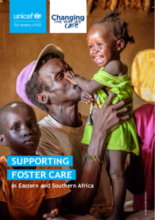childrens_living_arrangement
Displaying 1 - 10 of 17
In this webinar, the Independent Expert on the Enjoyment of Human Rights by Persons with Albinism, Muluka-Anne Miti-Drummond, shared findings from her recent report on children with albinism and the right to family life. Staff from UNICEF and NGOs in Madagascar, Tanzania, Malawi and Uganda also shared lessons learned.
The UNICEF/ CTWWC Regional learning platform on care reform in Eastern and Southern Africa will be holding a webinar on care reform for children with albinism. What do efforts to care for children with albinism tell us about disability inclusive care reform? Efforts to prevent family separation and support family-based alternative care for this highly vulnerable group of children have led to many lessons learnt on care reform in Africa.
This paper examines the nature and benefits of foster care and identifies some of the key challenges associated with this form of care in Eastern and Southern Africa. It outlines the elements of an enabling environment needed for successful large-scale foster care programmes, including legislation, guidance, changes to social norms, coordination mechanisms, and a strong social service workforce. The paper also provides lessons learnt from the region on how to support each stage of the foster care process.
This video series from UNICEF shares the stories of young girls living through COVID-19 – coping with the fears of child marriage, the struggles of distance learning, and the burden of isolation.
Objectif global: Assurer une assise juridique opérationnelle pour la mise en œuvre de la législation relative à la protection des enfants privés de soins parentaux.
In this video for BBC News, Southern Africa reporter Pumza Fihlani went to visit Antalaha Prison in Sava, one of Madagascar's biggest vanilla-producing regions, to expose the "worrying" conditions of the prison where children accused of stealing vanilla beans are being held (some for up to nearly three years without trial).
This paper examines all policy and laws related to families in the South, West, East and Central regions of sub-Saharan Africa.
The special issue of Emerging Adulthood titled “Care-Leaving in Africa” is the first collection of essays on care-leaving by African scholars. This article, coauthored by scholars from North and South, argues in favor of North–South dialogue but highlights several challenges inherent in this, including the indigenizing and thus marginalizing of African experience and scholarship and divergent constructions of key social concepts.
L’objectif de la consultation est d’appuyer le Ministère de la Population, de la Protection Sociale et de la Promotion de la Femme (MPPSPF) pour la finalisation du Projet de décret réglementant le dispositif des familles d’accueil et l’élaboration de son exposé de motif.
This article from the Telegraph discusses potential problems that can occur with student volunteers.

